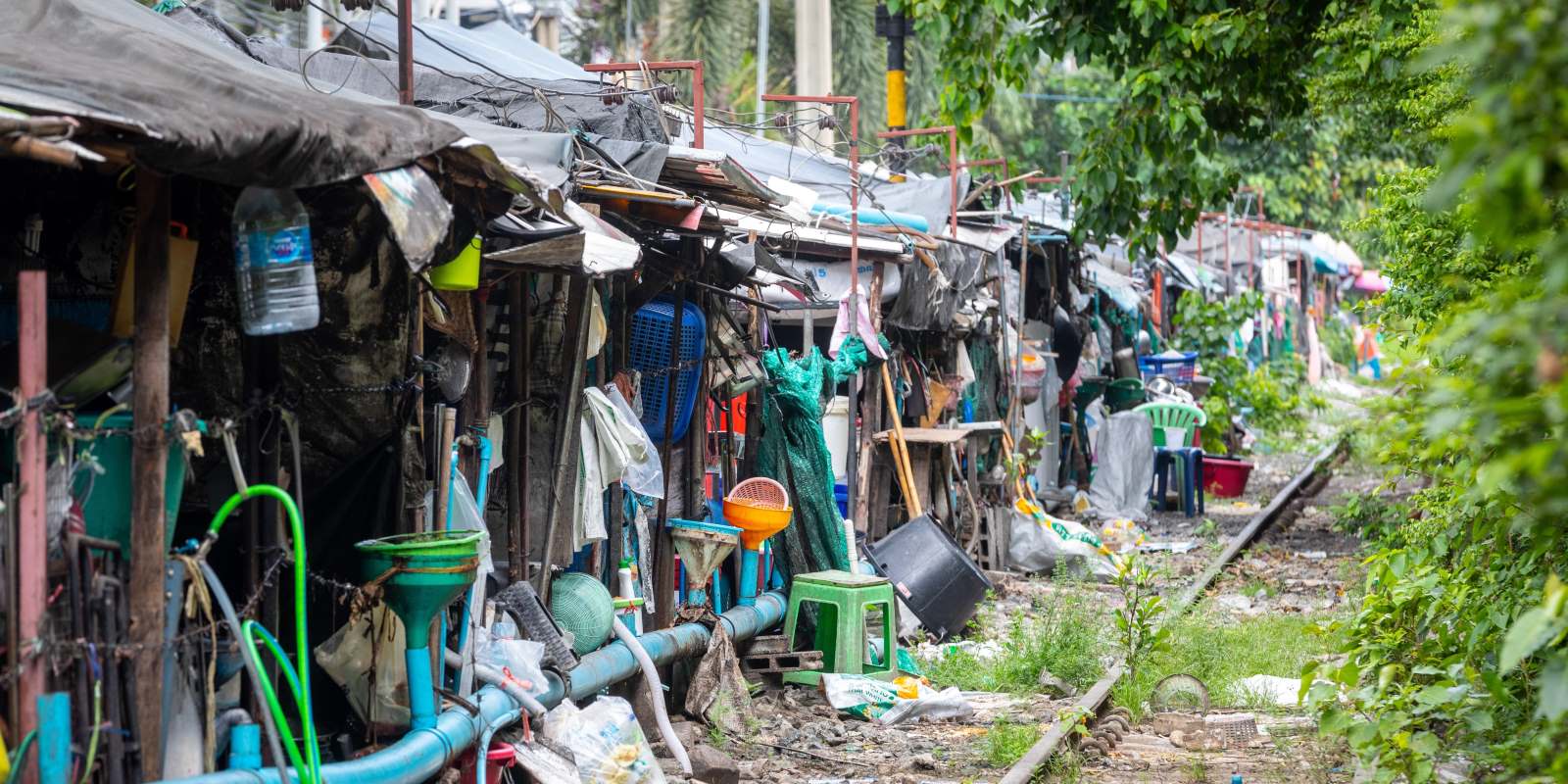Development discourse is replete with expressions such as the “informal economy”, “informal labour” and “informal settlements”, writes Annalena Oppel. But behind the outwardly neutral use of these terms, how far does the formal/informal dichotomy carry forward inherent and historical hierarchies? What do these terms conceal – and what does a progressive, expansive way forward look like?
“Informal” is generally taken to mean “lacking form” or something that is “not in accordance with the rules of formal logic”. The Oxford English Dictionary defines it as “relaxed and friendly; not following strict rules of how to behave or do something” whereas Merriam-Webster states “marked by the absence of formality or ceremony”. In order to declare something as informal, then, one needs to have some form or logic to compare it with. Within the context of development, these “forms” are often measured by a Western yardstick, with deviations often depicting a mismatch between global North concepts and global South realities.
Tracing the use of “formal” vs “informal” in development studies
Informality entered the development discourse via the International Labour Organization’s 1944 Declaration of Philadelphia, which sought to offer a roadmap for establishing full employment for all societies. To achieve this, a universally applicable concept of unemployment was needed. But there was a snag: the systems of wage labour and economic livelihood found in the global North were mostly inapplicable to societies in the global South, where only a minority sustained themselves through wage relations. This meant that efforts to conceptualise unemployment in the global South led to somewhat paradoxical encounters, sometimes described as a process of “importing” unemployment to the developing world.
It was this mismatch that led to the term informal, largely used to describe economic practices, forms of organisation and spaces embedded in non-formalized, non-written, and often social relations. The informal sector includes informal traders or shops that are not formally registered. Beyond the concept of labour, it also includes informal housing (e.g. building a house on a plot without holding a land title) and informal social protection (e.g. kinship support). It is defined by the International Monetary Fund as “activities that have market value but are not formally registered”. This illustrates the technocratic, transactional, and efficiency-oriented lens that dominates narratives of informality in development circles today: the informal sector as a space to correct. The persistence of the informal sector is then often depicted as the “stubborn child” in development: a space which defies the attempts of the international community to improve its economic performance, thereby rendering itself inefficient.

To properly understand the informal/formal dichotomy, however, we need to go back to an earlier mismatch between Northern conceptual framings and Southern realities – the traditional/modern distinction. For example, in the Lewis two-sector model, the traditional is defined as the subsistence or agricultural sectors and the modern the capitalist industrial sector. This distinction is often assumed to be a natural occurrence, and one that will eventually dissolve under assumed economic development trajectories. In reality, however, it resonates closely with the intersubjective relations laid out in writings on coloniality: the traditional of the subaltern versus Western modernity, the primitive versus the civilized, the mythic versus the scientific.
To understand the informal/formal dichotomy, we need to go back to earlier writings on coloniality: traditional vs modern, primitive vs civilized, the mythic vs the scientific
However, the replacement of the “traditional” with “informal” was not so much a political act to neutralize the term as a consequence of the fact that perceived “traditional” spaces seemed to produce modern activities. It was a conceptual fallacy, then, that led to the update. However, against this backdrop, it has been argued that rather than doing away with it, the shift towards formal/informal merely echoes colonial dichotomies between modern and traditional sectors – just in a way that is more compatible with the sterile language of technocratic approaches to development. If that is true, it gives further credence to the view that international development tends to erase its colonial past, with Eurocentrism continuing to constitute the benchmark for development.
How should we think about “informality” today?
Within the development discourse, there is now a vast catalogue of terms that carry informality, like an array of side dishes that all come from the same basic menu: the informal economy (perhaps broadest term), informal labour, informal social protection, informal safety nets, informal settlements, informal workers and so on. Through this lens, various inadequacies and inefficiencies are revealed that hamper individuals’ livelihoods, dignity, access to public services, or rights. And so, leaving a historical lens aside, it should be acknowledged that present work on informality can reveal important hardships, deficiencies, and obstacles in people’s daily lives. Within the existing paradigm of developmentalism, then, it has become a necessary lens, constituting the focus of platforms advocating for the visibility, rights, protection, voice and opportunities of those within the informal sector: take, for example, the Women in Informal Employment: Globalizing and Organizing platform (WIEGO).
The issue is that when set into a more holistic view, which spaces are considered informal is really not straight-forward to answer. It is not simply a matter of the informal periphery surrounding the formal centre (specifically, Eurocentrism). A better way to think about it might be to take informality is an in-between space expressing a certain proximity to Western interests and knowledge hierarchies: close enough but not quite there.
For instance, with more in-depth understanding of the lifeways and lifeforms of indigenous communities, the term “informality” vanishes, unless when talked about as capitalizing on traditional occupations and knowledge. Beyond a narrow (capitalist) economic lens, indigenous social and economic organizations seem too far removed and carry too little resemblance to be measured against formal capitalism. The “forms” and concepts of capitalism simply do not come close. Informality could then be viewed as the creation of a transitional space between non-capitalist and formal capitalist spaces: within reach, and in some ways resembling formal spaces, yet not embodying their logic and practices. Indeed, it has been argued that the informal often repurposes spaces intended for other uses by the formal, such as turning sidewalks into shops.
Informality could be viewed as the creation of a transitional space between indigenous and formal capitalist spaces: within reach, and in ways resembling formal spaces, yet not embodying their logic and practices
Where does this leave us? The decolonial movement, at its core, is a movement of expansion, not erasure. The present discussion is thus intended not as a bid to drop “informality” from development handbooks and discourse, but to highlight how certain terms (of which informality is one) carry an inherent and historical hierarchy. Using them comes with a political responsibility about the narratives that they continue to propagate.
A narrative towards formalization, while perhaps intended to be value-neutral, carries with it the notion of continued coloniality: a bid to transform spaces deemed as informal/inferior/lacking by aligning them to the dominant forms of economic and social organisation familiar to the Western onlooker. The fact that in those informal spaces often lies a source of innovation to develop different paths and systems, rooted in altogether different principles, is easily overlooked.
A narrative towards formalization, while perhaps intended to be value-neutral, carries with it the notion of continued coloniality: a bid to transform spaces deemed as informal/inferior/lacking
Revisiting dichotomies in development can therefore be an invitation to rethink whether or not the terminology and pathways that these divisions engender keep us open to the alternative pathways that will be needed to deliver a more sustainable and equitable system for all. Besides efforts to think outside of the box, researchers in the West may also be required to put the box aside for a while and listen to those who have seen it only from a distance.
All articles posted on this blog give the views of the author(s). They do not represent the position of LSE Inequalities, nor of the London School of Economics and Political Science.
Image credits: LongJon and Alexandra Lande via Shutterstock.





